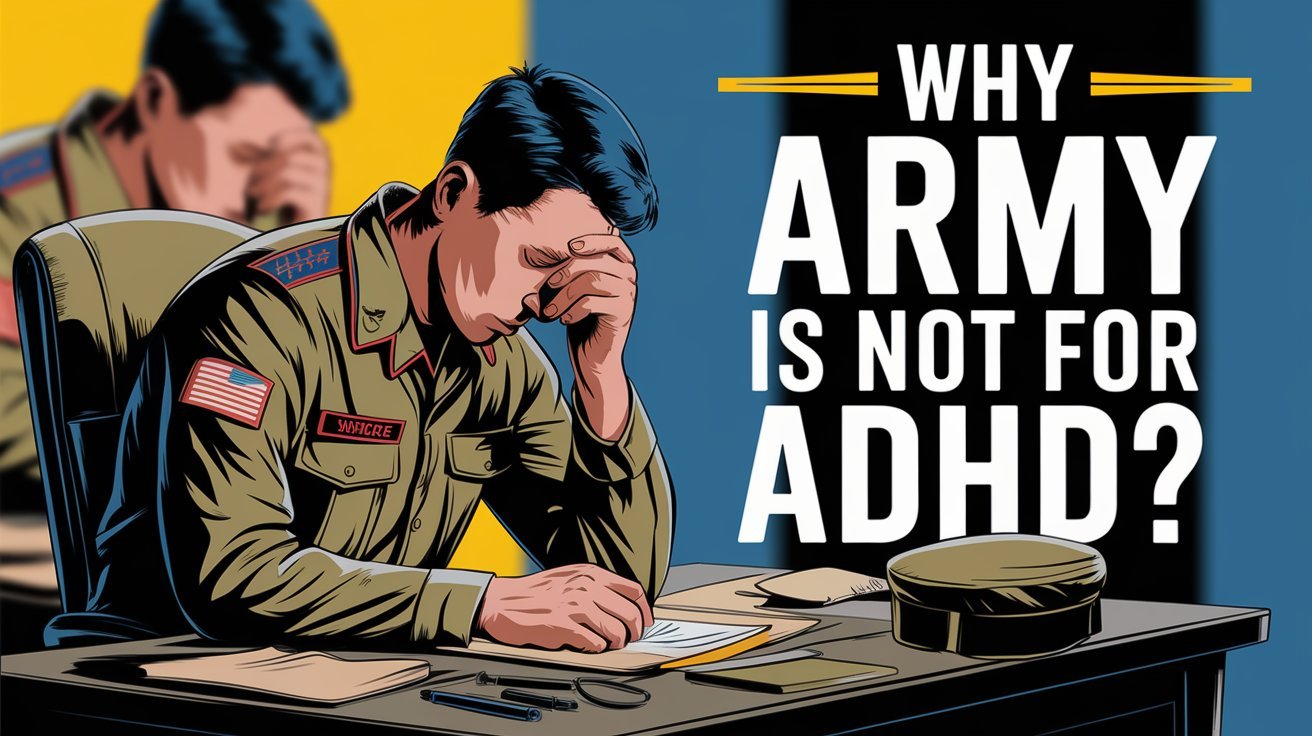Why Army Is Not For ADHD: Challenges and Regulations

Can people with Attention Deficit Hyperactivity Disorder (ADHD) join the military? The answer might surprise you. ADHD affects 4-12% of school-age kids. It can make military service tough.
The military has strict rules for ADHD. These rules can stop some people from joining. It’s a big decision for those with ADHD.
Military Disqualification Standards for ADHD Candidates
People with Attention Deficit Hyperactivity Disorder (ADHD) face unique challenges in military service. The Department of Defense has set clear medical guidelines. These guidelines outline what makes someone with ADHD unfit for service.
Department of Defense Medical Guidelines
The Department of Defense says ADHD is a disqualifying condition under certain conditions. These include having an Individualized Education Program (IEP) or 504 Plan after 14, having another mental health issue, or using prescribed meds in the last 24 months. Each military branch has its own rules, so recruiters can give more details.
Time Requirements Off Medication
Military wants people with ADHD to be off their meds for a while. Usually, it’s 12 to 24 months before they can join. But, the exact time can differ between branches.
Academic Performance Criteria
Military also looks at how well someone did in school. They check transcripts, test scores, and any bad grades or work performance. Doing well in school without needing special help or meds is very important.
Why Army Is Not For ADHD: Medical Screening Process
People wanting to join the U.S. Army or other military groups must go through a detailed medical check at the Military Entrance Processing Station (MEPS). This check aims to find any health issues that might stop someone from doing their job well. It looks for conditions that need medicine or special help.
At MEPS, applicants must fill out the Accessions Medical Prescreen Report (DD 2807-2). This form asks about any ADHD tests or treatments they’ve had. Doctors at MEPS will look at the applicant’s health records. They might ask for more info to understand the ADHD situation fully.
The military wants to make sure candidates with ADHD can handle the tough tasks of military service on their own. They don’t want to use ADHD medication or need special help. This strict check is to keep the armed forces ready and strong.
Those with a history of ADHD in military might find it hard to get in. The military sees ADHD military disqualification as a way to keep everyone fit and doing well.
ADHD Medication Restrictions in Military Service
For those with Attention Deficit Hyperactivity Disorder (ADHD) wanting to join the military, medication rules can be tough. The Department of Defense (DOD) has strict rules about ADHD meds. These rules can affect if you can join and how the process goes.
Prescribed Medication Time Frames
The military wants candidates to be off ADHD meds for a long time. This can be 12 to 24 months. They want to see if you can do well without meds.
Documentation Requirements
People with ADHD history need to show detailed doctor notes. These notes should show how long they’ve been off meds and how well they’re doing. This is key for the military to decide if you’re right for service.
Alternative Treatment Options
Some military groups might look at other ways to help with ADHD, like therapy or coping skills. But, each group has its own rules about meds and what’s needed. It’s important to know the rules of the branch you want to join.
Military Entrance Processing Station Evaluations
People with ADHD face big hurdles when they want to join the military. The Military Entrance Processing Station (MEPS) is a key place for these challenges. Here, they get a detailed medical check and take the Armed Services Vocational Aptitude Battery (ASVAB) test.
Doctors at MEPS look closely at a person’s ADHD history, including any meds and school grades. The ASVAB test doesn’t offer special help, which tests many skills. This test is key to see if someone can join the military and if they need a medical waiver.
Those with ADHD, needing special plans at school, or work help after 14 might not make it. Also, having other mental health issues or using ADHD meds recently can stop you from joining.
The MEPS checks make sure only the best fit people join the military. For those with ADHD, getting through this is tough. They might need a waiver to meet the strict rules.
ADHD Waiver Application Process
For those with ADHD, joining the military can seem tough. But, it’s not impossible. Each branch of the military has its own rules and success rates for ADHD waivers.
Required Medical Documentation
People with ADHD need to gather a lot of medical records for their waiver. These include their diagnosis, treatment, and school records. Letters from teachers or doctors can also help show they can manage without medication.
Branch-Specific Requirements
Each military branch has its own rules for ADHD waivers. Some might need more tests or wait longer to decide. Knowing these differences is key for those trying to get a waiver.
Success Rates for Waivers
The success of ADHD waivers varies by branch. Some are more open, while others, like the Coast Guard, are stricter. Knowing the current success rates can help applicants decide if joining the military is right for them.
| Military Branch | ADHD Waiver Success Rates |
|---|---|
| Army | Approximately 50% in recent years |
| Navy | Estimated success rate of 60-70% |
| Air Force | Relatively high, with around 75% approval |
| Marine Corps | Relatively low, with a success rate of 30-40% |
| Coast Guard | Considered the most difficult for obtaining ADHD waivers |
Impact of ADHD on Military Performance
Attention Deficit Hyperactivity Disorder (ADHD) can greatly affect someone’s military performance. People with ADHD often do well in fast-paced situations and solve problems quickly. But, they might find it hard to organize and pay attention to details, which are key in the military.
The military worries about the use of medication and possible behavioral problems in stressful times. Yet, the strict rules of military life can help some with ADHD. It gives them a clear structure to follow.
Interestingly, the number of military personnel with ADHD has gone down since 2014. This change happened when the military made its health standards stricter. It shows the military’s effort to keep its forces strong and healthy, despite the challenges of adhd in military service.
Also, the military is finding it hard to recruit new members. Many people don’t meet the health and fitness standards needed. This situation highlights the need for a fair approach. It should value the strengths of individuals with adhd and combat roles while keeping the adhd military restrictions in place for success.
Current Service Members with ADHD Statistics
ADHD is more common than you might think, affecting 4.4% of adults and 9-11% of children in the U.S. But did you know it’s also found in the military? Recent studies have uncovered the number of active-duty service members with ADHD.
Active Duty Numbers
Between 2008 and 2018, ADHD was found in 1.7% to 3.9% of Department of Defense personnel. A 2018 study revealed over 41,000 active service members have ADHD. This shows that people with ADHD can serve in the military, but they might face extra hurdles during enlistment.
Branch Distribution Data
- 7.6% of active-duty soldiers in the United States Army screened positive for ADHD using the composite score.
- 9.0% of active-duty soldiers in the United States Army screened positive for ADHD using the item-response score.
- Native American/Alaskan Native respondents had prevalence rates about 1.5 times greater than White respondents for both composite and item-response scores.
- Servicemembers aged 25-29 and 30-39 had around 1.5 times greater risk of screening positive for ADHD compared to the 18-19 year-old group.
These numbers highlight how ADHD is spread across different military branches and groups. They offer important information for those making policies and leading in the military to better support service members with ADHD.
Military Career Alternatives for ADHD Candidates
People with ADHD might find it tough to join the active-duty military. But, there are other ways to help defend the country. These paths let ADHD individuals use their skills in important roles.
One way is to work in civilian jobs for the Department of Defense (DoD). The DoD has over 950,000 civilian workers. They offer many jobs, like administration, logistics, and IT.
Another choice is government contracting jobs. Here, ADHD folks can use their problem-solving and detail focus to help the military. Jobs include project management and technical support.
For those who like action, law enforcement or emergency services might be good. These jobs value quick thinking and adaptability, traits ADHD individuals often have.
Lastly, joining the National Guard or Reserves is an option. These groups might have easier medical standards than active-duty. It’s a way to serve part-time while keeping a civilian job.
Even with challenges, ADHD individuals can still make a difference in national defense. These alternative careers offer many ways to contribute.
Legal Implications of Concealing ADHD History
The Department of Defense (DoD) requires full disclosure of medical history. This includes any diagnosis of Attention Deficit Hyperactivity Disorder (ADHD) during the military enlistment process. Hiding this information can lead to serious legal issues for those wanting to join the military.
Providing false information or not disclosing ADHD can result in discharge. You could also lose benefits and face legal action. The DoD values honesty and integrity. Trying to deceive during enlistment is seen as a punishable offense.
Candidates with ADHD must be honest about their history. They should work closely with recruiters to get waivers if needed. Waivers might be granted in some cases.
It’s vital for those with adhd military disqualification to understand the need for honesty. Being truthful is key when it comes to military service. Adhd and military service can be complex. The adhd military restrictions must be carefully followed to ensure a successful enlistment.
FAQs
Why is the army not for those with ADHD?
The military has strict medical standards. They worry about ADHD causing behavioral issues and needing medication. ADHD can disqualify you from military service under certain rules, as the Department of Defense guidelines state.
What are the Department of Defense’s medical guidelines for ADHD disqualification?
ADHD is a no-go if you’ve had an IEP or 504 Plan after 14. If you’ve had other mental health issues, taken medication recently, or struggled in school or work, you’re out.
How long do candidates need to be off ADHD medication before enlistment?
You must be off ADHD meds for 12-24 months before joining. Your doctor needs to confirm this and say you’re stable.
What academic performance criteria does the military evaluate for ADHD candidates?
The military looks at your school records and test scores. They check if you can do military tasks without meds or special help.
How does the medical screening process work for ADHD candidates?
You must tell about any ADHD evaluations or treatments. Doctors at MEPS will check your records and might ask for more info. They’re looking for people who can handle military tasks without meds or special help.
What medication restrictions and documentation requirements do ADHD candidates face?
You need to be off ADHD meds for 12-24 months before joining. Your doctor must confirm this and say you’re stable. If other treatments work without affecting your duties, they might consider them.
How does the ADHD waiver application process work?
The waiver process varies by branch. You’ll need to submit your medical records, school transcripts, and letters showing you can succeed without meds. Each branch might have its own rules and requirements.
How can ADHD affect military performance?
ADHD can be a plus in fast-paced, creative situations. But, it can also make organization and focus hard. The military’s strict rules might help some with ADHD, but they’re cautious about meds and stress.
How many active service members have ADHD?
A 2018 study found over 41,000 active service members have ADHD. The number varies by branch.
What alternative military-related career options exist for ADHD candidates?
If you can’t join the regular military, consider civilian jobs in the Department of Defense. You could also look into government contracts, law enforcement, or emergency services. The National Guard or Reserves might have different rules than the regular military.
What are the legal consequences of concealing ADHD history during enlistment?
Lying about your ADHD history can get you kicked out of the military. You could lose benefits and face legal trouble. Always be truthful and work with recruiters to get through the waiver process if needed.






